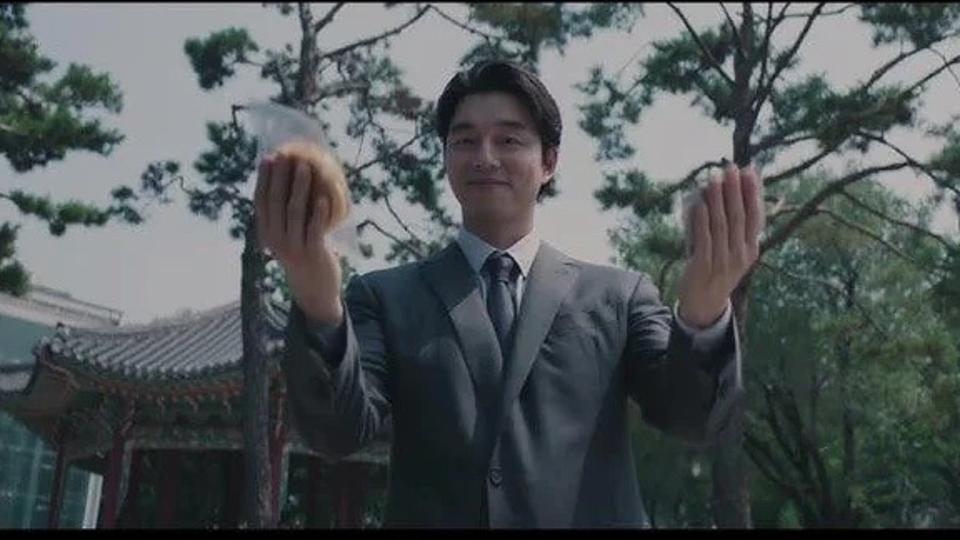In the scene of Squid Game Season 2, the stakes aren’t violence—it’s bread. A wealthy stranger offers unhoused people a choice: take a loaf now, no strings attached, or gamble it all for a lottery ticket with the promise of life-changing wealth. Most pick the ticket. No one wins. And in the end, the untouched bread is stomped into the ground.
It’s a gutting moment—but not just because of its cruelty. It lands because it mirrors something familiar: the way food is often used to reveal power, punishment, and the impossible choices that come with surviving under pressure.
That tension—between spectacle and survival—is nothing new for Squid Game, which rarely pulls punches when it comes to social commentary. But “Bread and Lottery,” the opener for Season 2, might be one of its most quietly devastating allegories yet.
And it feels especially sharp right now. The scene’s core dilemma—bread or risk—echoes how real people are navigating hunger, scarcity, and hope under conditions that make survival feel like a wager.
Why Hope Often Beats Hunger
At first glance, the choice between bread and a lottery ticket might seem to pit practicality against delusion. But it’s more complicated than that.
Behavioral economists describe this as a scarcity mindset—a cognitive tunnel vision that forms under chronic stress. It doesn’t just affect decision-making; it rewires what feels possible. When people live on the edge of survival, the immediate becomes background noise. What matters is the chance to escape the trap entirely, even if the odds are terrible.
That logic is everywhere. In many U.S. states, including Texas and Georgia, participation in lottery systems is highest in zip codes facing greater economic hardship—a pattern well-documented in consumer research.
And it’s not just the lottery. According to Pew Research, nearly one in five U.S. adults reported betting money on sports in the past year—a figure that climbs even higher among young men and lower-income Americans. The appeal isn’t just entertainment. It’s a sliver of hope disguised as a game.
These patterns echo broader economic pressures. Recent analysis from the Center on Budget and Policy Priorities warns that millions of Americans face rising hardship as pandemic-era safety nets vanish—making the pursuit of risk feel less like a gamble and more like a necessity.
We’ve seen this same pattern emerge in food culture, too. Whether it’s stockpiling eggs during pricing spikes or chasing fast food value deals that promise more hope than nutrition, people aren’t making irrational choices—they’re navigating impossible ones.
Not everyone, of course, chooses the lottery. Some do take the bread. But even that choice often comes with the weight of resignation—an acknowledgment that hope feels too expensive to carry.
Bread, Trampled: When Food Becomes a Weapon
That stomped loaf of bread? It’s not just a cruel gesture. It’s a symbol—and a tactic. The act of stepping on the bread isn’t incidental. It’s a deliberate humiliation, reinforcing the power dynamic between giver and receiver, between those who offer hope and those punished for believing in it.
Food has always been political. It’s more than nourishment—it’s leverage.
Time and again, food becomes the flashpoint—not because of its nutritional value, but because of who controls it.
- In pre-revolution France, bread shortages sparked riots—and though the infamous “Let them eat cake” quote is likely apocryphal, it reflects the era’s disconnect between hunger and power.
- During Ireland’s Great Famine, food exports continued even as locals starved—showing how hunger has often been less about supply than about control.
- In today’s U.S., food deserts persist in low-income areas while wealthier neighborhoods enjoy abundance. It’s a quieter form of oppression but no less devastating.
Just as bread has been wielded as a tool of control throughout history, Squid Game repurposes it as an instrument of judgment and shame.
Food as Symbol, Again and Again
This isn’t the first time Squid Game has turned food into a test of survival.
In Season 1, the now-iconic Dalgona candy challenge forced players to carefully carve shapes out of a brittle sugar disk—another moment where something sweet became a symbol of cruelty. The candy went viral in the real world, but as I wrote in January, its cultural meaning runs deeper than a TikTok trend. It speaks to childhood, pressure, and the waysomething seemingly simple can become impossibly loaded.
That’s the throughline: in Squid Game, food is never just food. Whether it’s candy or bread, it becomes a vehicle for judgment—who gets to survive and who gets punished for trying.
And it’s not just this show. From The Hunger Games and The Menu to literary works and beyond, fictional food often tells real stories. About power. About shame. About how the most ordinary items—noodles, soup, a crust of bread—can become the most loaded.
The Real Game: Choice Under Pressure
“Bread and Lottery” sets the emotional tone for what follows in Season 2. Later, the same question returns: risk everything for a better future, or take the sure thing and walk away? Once again, the hope of transformation wins out over survival.
It’s a pattern—on-screen and off. We see it in gig work, predatory loans, risky health decisions, and how people engage with food systems. When the present feels impossible, any door out looks worth opening.
It’s easy to watch scenes like “Bread and Lottery” and think of them as symbolic. But for many people, there’s nothing metaphorical about these choices. The hunger is real. The risk is real. And so is the pain of picking hope—only to watch it fall apart.
So what’s the takeaway here? Maybe it’s not just about how we judge desperate decisions—but about understanding the systems that produce them.
When survival itself is conditional, the illusion of choice becomes the cruelest game of all.

